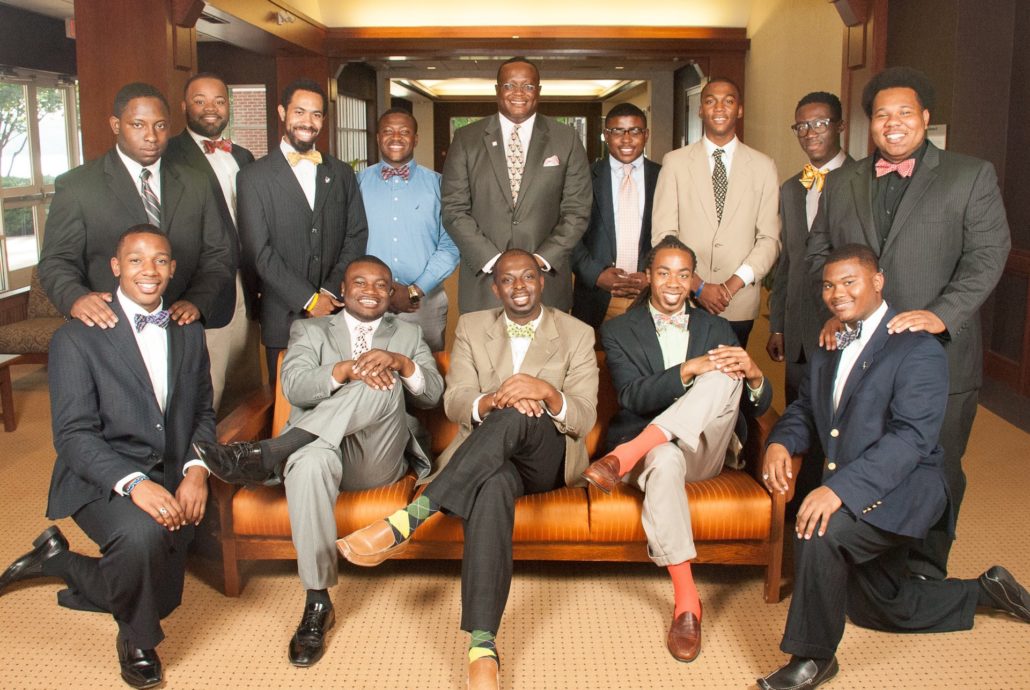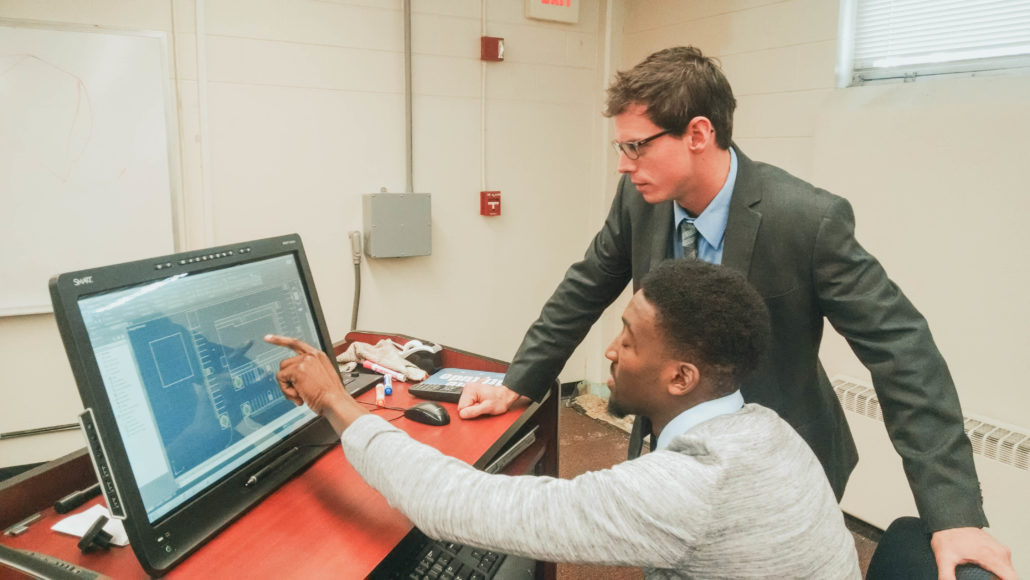
Share This Article!
Related Articles
Going Back to School: Clemson Students Help Anderson Adult Education Center
By: Marissa Kozma
On Senior Lecturer of English Phil Randall’s desk is a letter about his former student Michael Muthleb.
Muthleb is currently attending Michigan State University College of Law. His long letter of acceptance adorned with the Michigan State logo hangs with post-it notes of things to do on Randall’s wall above his old computer monitor. But for Randall, the letter also serves as another reminder—a reminder of one of the many successes of his students and joys that teaching has brought him.
When Muthleb first enrolled for Randall’s Business Writing (ENG 3040) class two years ago, he never thought the skills he learned in the classroom would be so utilized today in a different classroom setting. They weren’t just business writing skills, either.
For eleven years, students like Muthleb have been registering for Randall’s courses, but have been happily surprised to find that Randall has a different approach to teaching—one that he believes will not only benefit the students more personally, but also the community.
“Companies are repeatedly looking for folks that can self-manage, can run a long-term project, work on a team and communicate in multiple forms. What this program does is let them give specific examples of how they have done all of those things,” Randall said.
Randall says that his classroom structure isn’t only that of a traditional lecture style, but also focuses more on high-performance teams and strong collaboration among peers. The idea first began with the implementation of service-based learning and the philosophy of Writing Across the Curriculum. When Randall first heard of it from his former mentor Summer Taylor, he knew that his students would benefit and got started creating what would become his legacy.
Since then, Randall and his students have helped over 25 non-profits in the upstate, and the legacy is only getting bigger. Each semester, Randall’s students work on a new project to benefit their non-profit clients, and Randall gives his students minimal guidelines for what that project might entail. Their goal is to solve a problem for their client using the business proposal writing skills that the class is structured upon.
For eleven years, students like Muthleb have been registering for Randall’s courses, but have been happily surprised to find that Randall has a different approach to teaching—one that he believes will not only benefit the students more personally, but also the community.
Although each client project every semester has made a tremendous impact, there is one particular project that Randall and his students can’t seem to forget—one that they have been working on for the past three years.
When Randall and his students first learned of the Anderson Adult Education Center, they were shocked to find that the small Depression-era school, formerly known as North Anderson Elementary, had been accepting adults over the age of 18 who had wanted to continue their education and receive their GED since 1964. They were even more shocked that the school with a current enrollment of 571 students, had somehow fallen off the radar of the Anderson School Board.
Randall and his students have therefore continued working with Anderson Adult Education Center because the need is so great.
“We have over 47,000 adults in the upstate that never finished high school. We have thousands who can’t read at all. Illiterate adults. And the task has been given to adult education to try and help those people transition from the old industry that we had—the textile industry, where you could quit school in seventh grade and get a job and have a career and raise a family. When those jobs left, we never really found a good substitute for that industry, and so it’s been on those folks to up their skills,” Randall said.
Anderson Adult Education Center is doing just that. Despite poor funding and used textbooks, the center has managed to keep afloat. Each semester Randall and his students are coming up with different ways to make a difference, but Randall says one of the most important things they work on is simply building student morale.
“One of the biggest problems that’s happened with Adult Education students is that they’re embarrassed to admit they have this need.
I’ve heard stories of people that have spent two years driving around the building trying to work up the courage to walk in there and say ‘I’m 50 years old. I just got laid off. I’ve faked it all this time. I actually ended up with a middle management job, but the truth is I can’t read,’” Randall said.
“In that last recession all those people got bumped out and now they can’t get back in because it’s obvious that they kind of just grew with their job. They covered it up, and they need help. It’s a hard thing for them to admit.”
Randall also says morale is very important for keeping students enrolled and willing to work hard to finally receive their GED. For many students who never completed school and have become discouraged, this is a very difficult task.
“One of the things we learned was that when you finally start to get someone to start an adult education program, the first two weeks are really crucial, and if you lose them, then you’re probably going to lose them for good because it reinforces an old self-image that was not positive,” Randall said.
“The main reason you went to college is that someone started telling you early on that you could go. You start thinking that. These students get exactly the opposite—‘You won’t go to college. In fact, your dad’s in jail or we’ve never gone to college and you’re not that smart. These are all the totally wrong signals that destroy their sense of ‘I could do that. That’s a possibility for me.’”
Randall also emphasizes that it’s hard to keep their morale, especially when the students are forced to use secondhand materials that have been worn out in the public schools.
“Imagine you’re 50 years old, you sit down and you start learning to read by reading about Big Bird and Sesame Street and Dr. Seuss. It’s degrading, and it rubs salt in the wound. It’s like saying ‘You sure are behind, that’s why we’re treating you like your grandchildren.’
“One of the biggest problems that’s happened with Adult Education students is that they’re embarrassed to admit they have this need. I’ve heard stories of people that have spent two years driving around the building trying to work up the courage to walk in there and say ‘I’m 50 years old. I just got laid off. I’ve faked it all this time. I actually ended up with a middle management job, but the truth is I can’t read,’” Randall said.
To help with this, Randall’s students have been developing their own reading materials. They are written on a beginner’s level and are about more relevant issues, such as how to prepare for an interview and how to enhance their professional image.
“The goal is to let these people maintain some self-respect while they learn very fundamental words and simple sentences, but doing it in a way that is relevant to an adult,” Randall said.
This experience has also made Randall’s students very aware of the many opportunities they have and given them a better awareness of the impact illiteracy has had in the upstate.
“It made me further appreciate the opportunity that my parents have given me by supporting me to attend college. I saw firsthand the impact that not having a college degree or a support system back home can have on the rest of your life and the decisions you make, and I am very thankful and blessed to have both,” junior finance major Amanda Gauger said.
Randall and his students have also worked on representing the Anderson Adult Education Center at Anderson District 5 Board meetings—something Randall has named as very good practice for writing business proposals, a strong part of the curriculum in his class.
“They did such a good job that the superintendent of Anderson wrote me a letter and told me how impressed he was with the job they did. They were as good as architectural firms that went before them,” Randall said.

The Clemson Athletic Department has also taken notice of Randall and his students’ work, and has been collaboratively working to support the lives of the students at Anderson Adult Ed. and reward the students who successfully complete the program. Former football running-back Andre Ellington and former quarterback Tahj Boyd have made personal visits to see the students, and have given them a signed football autographed by the team and Coach Dabo Swinney. The students also received a tour of Death Valley, Littlejohn Coliseum and a luncheon—an exciting thing for many of the students that have never left Anderson County.
A lot of the students at the Anderson Adult Education Center were surprised that Clemson students took such an interest in them and their education.
“They really loved the sense that Clemson students are in their corner. They appreciated that Clemson students would be interested enough to get involved with their success in some way—whether it’s an encouraging word or new materials, a motivational effort, or setting something up—all of those things add up,” Randall said.
Randall believes that the real success in this continuing project is because of his own students, who he says are very driven to make an immediate impact after working hard for only a semester. His students have treated the class like a business and have made him proud in their ability to work like a team. Randall cannot imagine giving his students anything but complete creative liberty, and is definitely planning on continuing to give them the opportunity to make a difference at Anderson Adult Education Center.
“One of the biggest lessons I’ve learned is that if you approach it this way and get out of Clemson students’ way, they will totally outperform your expectations,” Randall said.

Written By: Marissa Kozma
Was an intern at the Pearce Center during Spring 2015. She is originally from a small town outside of Toronto Canada, but is currently living in Mount Pleasant, South Carolina. She graduated with a degree in English with a focus in writing and publication studies and a minor in Writing and Pedagogy at Clemson. At Clemson she was an Executive Editor of the Decipher magazine, a tutor for the Clemson Writing Center and a children’s reading tutor for America Reads Program.




